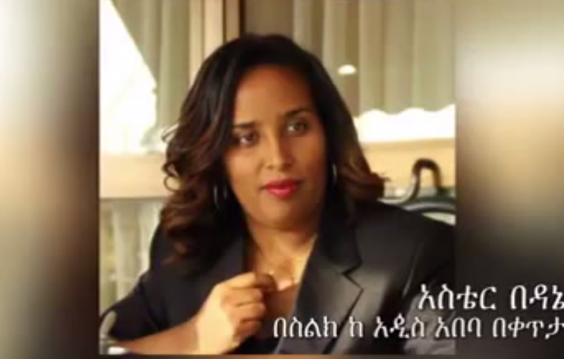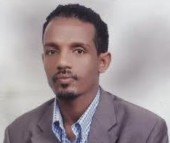Ethiopia: Politics, Artists, and Fear
by Chalachew Tadesse / February 2, 2015 / 1 Comment
One question at the ruling party’s 40th anniversary celebration underpins the state of collective fear in Ethiopia’s artistic community.

Aster Bedane dropped a bombshell question on an Ethiopian military leader. Photo via YouTube user: Asham Addis.
A few weeks ago, the Tigray Peoples’ Liberation Front (TPLF), the core party of the ruling coalition Ethiopian Peoples’ Revolutionary Democratic Front (EPRDF), celebrated its 40th anniversary. Interestingly, the celebration took place in Dedebit, a barren and remote area in northern Ethiopia. In 1975, Dedebit was the location of the TPLF’s first military base, when it was a rebel guerrilla group waging war against the Marxist-Leninist dictatorship of Colonel Mengistu Hailemariam. A tour of Dedebit, organized for artists- singers, actors, poets, writers, filmmakers- and some loyal journalists dominated the celebration. Most of the old TPLF/EPRDF guards were in attendance. One key figure, however, was conspicuously absent: the late Prime Minister Meles Zenawi, TPLF’s former Marxist-Leninist ideologue and longtime chairman.

- This column’s topics will include literature, art, education, history, and political culture in Ethiopia, as well as society and politics in the Horn of Africa. Moreover, I will address the tribulations of journalists and the ill-fated constitutional right of freedom of expression under Ethiopia’s deceptive authoritarian regime. I will try to be the voice of the voiceless, be it persecuted journalists at home or exiled journalists abroad. These themes will make Ethiopia’s uniqueness and absurdities evident.

- Chalachew Tadesse is an Ethiopian journalist and columnist. He has previously worked as a full time journalist for The Reporter and The Sub-Saharan Informer English newspapers. He was also a columnist for the much-acclaimed Fact magazine, before the Ethiopian regime closed it in October 2014. A political science student by training, he works as a university lecturer and is known for his sociopolitical commentaries on the Ethiopian private press.
For a few days, the state media put the fanfare in Dedebit in the limelight. We heard much about the artists romanticizing and eulogizing TPLF’s long and arduous armed struggle for the democratic cause. Ironically, TPLF itself was originally a Marxist-Leninist organization. At the celebration, old guards lectured artists with narratives that combined fact and fiction. Applause followed and at such a volume that it echoed across Dedebit’s plateaus and gorges. Notwithstanding Ethiopia’s tragic civil war, artists swore publicly to convey TPLF’s success story from the battlefield to the world. This was what the old guards sought to achieve from the tour, after all.
All was going as planned until a certain Aster Bedane, an actress and film producer, expressed her ambivalence to the status quo candidly but cautiously. A video showed her posing a question to one of the regime’s old guards: “Will you really transfer power through elections?” Surely, this question resonates with Ethiopians and non-Ethiopians alike.
Samora Yenus, a TPLF veteran and currently Ethiopia’s Chief of Staff, was sitting on the podium. Strangely, Ethiopia’s four-star General didn’t hesitated to respond to Aster’s purely political question. To make matters worse, he lambasted the beleaguered opposition parties, despite the fact that Ethiopia’s constitution mandates the Chief of Staff should be non-partisan. Here is one of Ethiopia’s many absurdities.
Notwithstanding her superb performance, the actress did not receive applause from the audience. However, the General’s reply did. Eulogizing power is always the quintessence of most Ethiopians’ psyches. Later, however, social media, one of the last surviving fortresses of dissent in Ethiopia today, plucked Aster from obscurity and made her a heroine.
By the way, all politicians present evaded answering Aster’s question, while sitting virtually dumbfounded with frowned faces. Not even a single attempt was made to reply, even for the sake of political expediency. Presumably there were only two plausible reasons for their evasion: firstly, the question conflicted with the tour’s celebratory purpose, and secondly the TPLF/EPRDF is not yet ready to transfer power democratically. With no endgame in sight, and by hook or by crook, the ruling party is resolved to stay in power.
I think Aster’s question highlights three fundamental issues: authoritarianism, pervasive fear, and the role of artists in Ethiopian society. Unequivocally, her question was a “bombshell” for the regime. To begin with, as I stated already, the regime gives little clues as to whether it would transfer power democratically if defeated in free and fair elections.
Moreover, Aster’s question was so timely that it had a stinging power, as Ethiopia is set to hold its fifth General Election in May 2015. Of course, like previous elections, this will be nothing more than another farce to be recorded in Africa’s political history. Mind you, the regime has banned all international election observers, including the European Union. Oh, forgive me, the African Union (AU), which declared the 2010 elections free and fair, will observe it! Ironically, Zimbabwe’s Robert Mugabe – another master of fraudulent elections in Africa – will be the top boss when AU observes Ethiopia’s upcoming election, as the African Heads of State summit held in Addis Ababa last week elected him to the post for 2015.
For the last few weeks, an orchestrated political plot, including a violent crackdown on peaceful demonstrations, was underway to weaken or possibly exclude the two largest opposition parties – Unity for Democracy and Justice and All Ethiopian Unity Party – from the election, and make the result a one-party landslide. As I am writing this, the National Electoral Board of Ethiopia (NEBE) passed a shameful decision. Based on unconvincing allegations of non-conformity to party bylaws that led to the existence of the so called “rival” leaderships, NEBE revoked the legality of the incumbent leaders of both parties, and accorded legal recognition to the minority dissenting factions, which are most possibly the regime’s puppets.
In the event of strong and competitive opposition parties, this is the ruling party’s usual dirty game. Quintessential retributive measures such as this prove the accusation that NEBE is the ruling party’s right hand. In fact, the fact that the police immediately rounded up the offices of both parties and confiscated documents at gunpoint even before the incumbents appeal to the court is a clear indication that the NEBE’s decision was part of a political conspiracy.
Regrettably, Ethiopia is still immune to the wind of democratic changes blowing across Africa. The fact that the opposition currently has only one seat in the 547-seat parliament is absurd. Believe it or not, over 70 opposition political parties exist in the country, another absurdity in itself.
For over two decades, the regime has institutionalized fear. With many renowned opposition politicians, activists and journalists behind bars, dissenting voices are almost completely subdued. Art and artists are also expected to serve one extrinsic purpose: to romanticize economic growth and advance the regime’s ideology of “revolutionary democracy.”
After the celebration in Dedebit, Aster told a journalist that she had feared what could happen to her if she asked her question. Certainly, no one can lose sight of the regime’s vengeance and vilifying behavior. Nevertheless, she dared to speak truth to those in power, no matter the cost. Whatever she said later, about the over-politicization of her comment by the regime’s critics, doesn’t matter much. What is more worrisome, however, is her testimony about the treatment she received from her fellow artists. “Almost all the artists ostracized me…they feared to stand up for me,” Aster said. For this, the most plausible explanation is that her fellows feared that they would be labelled with her dissenting views. Nothing underpins the state of collective fear engulfing Ethiopian artists more than this. That is why Aster’s question was a piece of sand thrown at a vast ocean of silence.
Undeniably, engaging in politics is a matter of individual choice. This aside, there are strong moral issues for artists. Should they be indifferent to problems associated with transgression of fundamental liberties, authoritarianism, abject poverty, inequality or social injustice? Don’t they have a moral duty to speak truth to power?
I argue that if artists are the embodiment of society’s identity and culture, then Ethiopian artists must assume moral responsibility to awaken Ethiopian society to reality. Under this regime, a quagmire of excessive repression, moral decadence, cultural bankruptcy, loss of national identity and decline of art bedevils our country, which prides herself on her unique alphabets and ancient writing tradition, as well as civilization. Before it is too late, artists must stop their hypocrisy, break the implicit symbiotic pact with the authoritarian regime and help reverse our nation’s downward trajectory.





One Comment on "Ethiopia: Politics, Artists, and Fear"
Dear editors of Sampsonia Way,
I thank you for inserting a beautiful picture of Aster Bedane, an Ethiopian actress, whom my article focused on. I forgot to attach her picture with my article. Anyhow, her picture partly illustrates the beauty of Ethiopian women.
Yes, Ethiopia is a country characterized by wax and gold- with too many contrasting features. It is a land of originality, classic legends and great wonders- and, yet it exhibits lots of absurdities.
First, Ethiopia is a country where current collective fear of authoritarianism juxtaposes with the age-old patriotism for freedom;
Second, Ethiopia is a country where the fact of the only non-colonized nation in Africa, and beacon of freedom and pan-Africanism juxtapose with its little interaction with other Black Africans and its failure to lead Africa;
Third, Ethiopia is a country where Ethiopia’s commitment for international justice (as evidenced by its commitment to the principle of “collective security”, its fight against colonialism and Apartheid) juxtapose with mockery of domestic justice by its rulers for many decades;
Fourth, Ethiopia is a country where national pride juxtaposes with current mass exile and extreme poverty;
Fifth, Ethiopia is a country where ancient civilization in architecture, art, belief in God (among the first to embrace Christianity) and philosophy/morality as well as unique calendar juxtapose with current backwardness in many aspects and a political system and curriculum based on the Western model;
Sixth, Ethiopia is a country where the pride of having ancient philosophy and indigenous knowledge juxtaposes with the reality of importing blueprints from elsewhere;
Seventh, Ethiopia is a country where a abundant natural resources juxtapose with extreme poverty, famine and Bob Geldof’s 1984 “Band Aid”;
Eighth, Ethiopia is a country where the fact of the “home of mankind” (archeological discoveries proved this with the discovery of 3,500 years-old complete human skeleton of “Luci”/popularly known as “Dinkinesh”, in Ethiopia in 1974) juxtapose with Ethiopia’s negligible place in the mainstream Western media and literature;
Ninth, Ethiopia is a country where ancient literary tradition and unique alphabets juxtapose with the current absence of freedom of expression and backward literature especially in foreign languages;
Tenth, Ethiopia is a country where the sense of Africanness juxtaposes with the reality of boasting of having a unique “Ethiopian identity”;
Eleventh, Ethiopia is a country where recurrent foreign invasions, and bloody and protracted civil wars juxtapose with national resilience and survival of the ancient Ethiopian statehood;
Twelfth, Ethiopia is a country where the fact of being the first country to welcome persecuted Muslims from Saudi Arabia more than 2,000 years ago (as ordered by Prophet Mohammed) and the age-old mutual coexistence of Judaism, Christianity and Islam juxtapose with the longstanding suspicion and anti-Ethiopian sentiments of many Muslim nations etc, etc…..